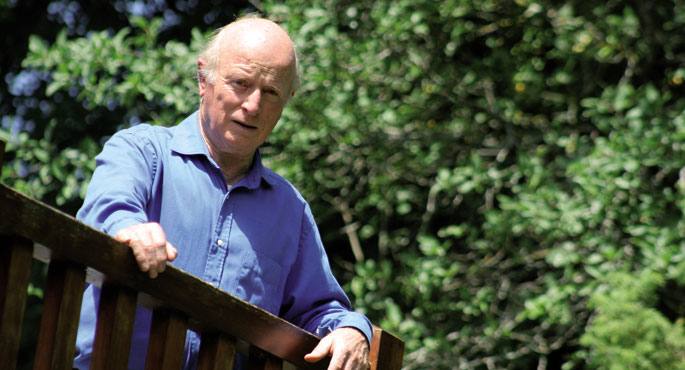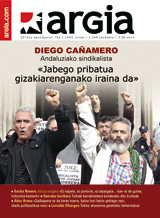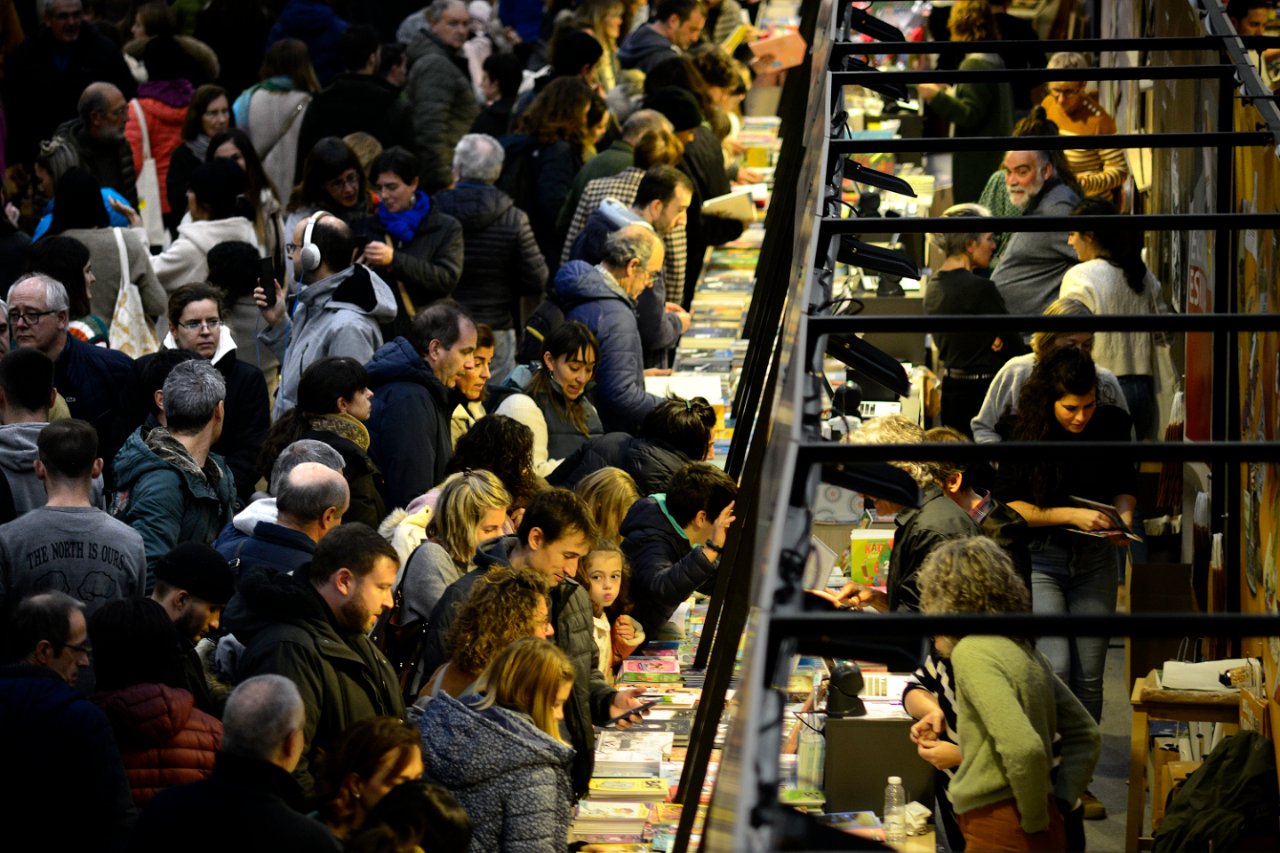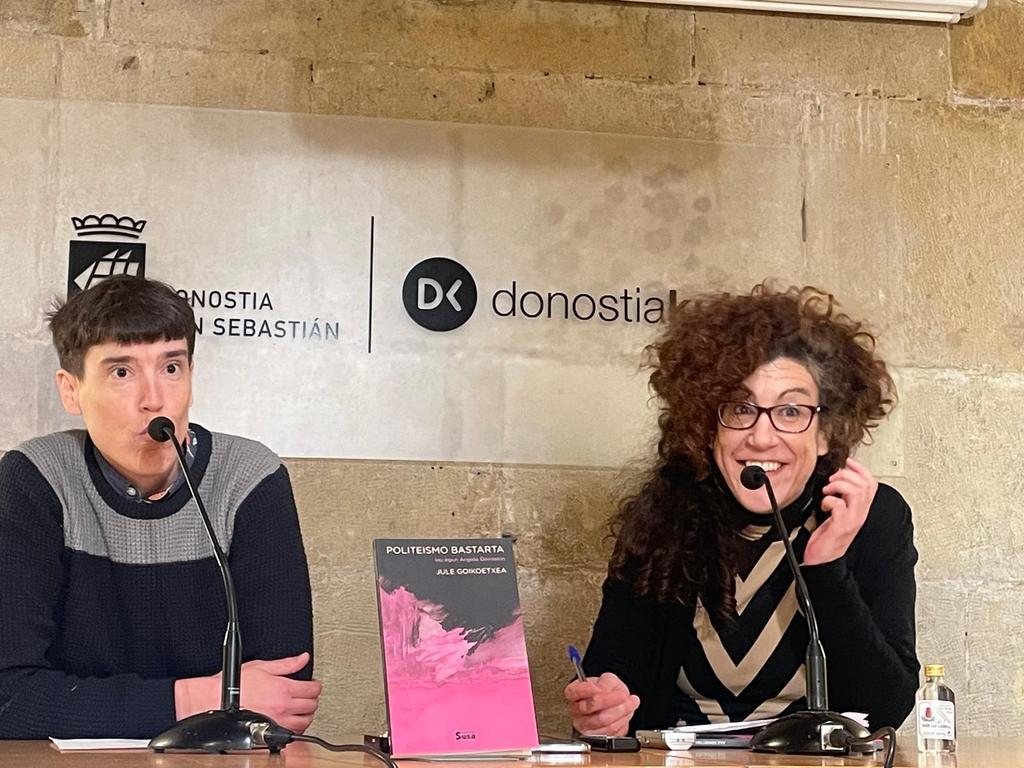“I’m told Zuük Zuberoa exports!”
- Jean Louis Davant is one of the largest names that the current Zuberoa has given to the Basque country. Teachers, writers, politicians, academics, parents… It has a lot of edges, and it has brought us with serenity and tranquility to each other.

The best thing we can do to you is ask where we have to put the dieresiduo.
In the verb, in the past, agitü, gertatü…
In other verbal and verbal forms?
Oh, yeah! You're calm, it's always easy for you. In Euskaltzaindia there are also people who try but say i, they cannot say it. My only recommendation is always tell you or, we know that you say so. This does not regret us, it does not make us angry, but it does bother us to hear too many things. My humble recommendation.
We arrived here and we came to Zuberoa. We arrived here and, instead, it’s always Zuberoa and Zuberoa…
Zuberoa is the historic name that we have accepted in Euskaltzaindia as the official name. But others, like Zuberoa and others, are also allowed.
Two minutes, two lessons. You are a great teacher, in that you have also lived…
Yes, always as a teacher.
However, as he studied agronomy, an agronomist, not a professor of Euskera. You, in fact, were born in a family of farmers...
Yes, in the house on the other side of the road: Zabalaina. The house we live in is new, Aizagerea. Near here was an old house that my father had bought. He went to Earth, and this man has taken his name. I'm from Zabalain, Jean-Louis de Zabalain. We are four brothers. I, the second one. So most of the hacienda was occupied by his brother. She was a great woman. The third is her sister Muskildi, married to a farmer. The room also attended the engineering school. He worked for a long time in Lur Berri, then in the Makea dairy … and then went with his wife to Galicia. There's his wife, Galician, French teacher, and there they were. They are now in Navarra. His wife claimed the change and got a position at the Sangü Instituteesa.Los two have recently retired and in Lower Navarra, Arberatze...
At home where you worked, did that put you on the road to studying agronomist engineer?
There was then a slug that was introduced from the old to the new agriculture. It looked like it was. It used to be a biological culture, I can tell you. Everything was done with plants, also fire with plants. Transport with cables. I work by hand or with cattle. Fertilizer, too, was an animal dung, a manure mixed with some other plant. We go from those natural to the artificial. Chemistry and machining, on the one hand and oil, on the other... The peasants were also at the mercy of oil.
You're talking big strides. Who was at home that way?
They all spoke so calmly, that I spoke more than everyone else. Maybe because I don't have the ability to speak. And I like to explain things clearly, yes. In spirit we are also Argizaiolas, the father explained things clearly, the mother also… They had a good language, and also a tendency to speak clearly, without laps, directly, saying things as clearly as possible… With power not with violence!
When you speak, you give peace ...
I don't know. I love communicating, and communicating is on both sides, not just talking, but seeing if the other listens to you, understands you, and what he thinks, what he's going to say. There is a displacement between two people.
Where is the writer's puffy ego?
… There is everything. As many names as writers!
You are a Catholic Christian, a believer…
Here everyone was, Christian and Catholic. There were some who frequented little church, but in the good feasts they were there, in the church. I learned Catechism, Catechism, Catechism in Basque, and there I tasted the Good Basque, the classic Sulatino, and we had it. [Atanase] This started with Belapeire in the 17th century. It was he who wrote the first books in Suletino. It was he who established the model, and the Church has always followed that model. The priests have always written in the classic Sulatino.
Does the Basque Country have a debt to the Church?
I think so, and a lot. It is said that the priests used Euskera to make their propaganda. Yes, that's right, and the others, why didn't they? Why didn't notaries write in Basque? What about doctors? What about judges? What about lawyers? Not only in Bilbao, Donostia or Baiona, but in Maule! There were judges and lawyers. Also in Donapaleu. And then they stayed. There was a notary in almost every village. There were also sergeants, agents of notaries, if you will, collaborators. There were also doctors and pharmacists, and very few of them have written in Basque… The priests have also written in Basque outside their profession. Some, not all! But none!
So, the unified Basque Country Hebenko has already done so before…
It was already done! Young people don't know her now, unless they walk around the church. They don’t know that classic Sulatino, and sometimes they reject their first works in vain…
“Young people don’t know that classic Sulatino.” What do young people know?
Less and less of what they've learned at home. They know what they've learned in school, especially what they've learned in the ikastola, or what they've learned in AEK. You learn it in Suletino, a little classic, you have to say.
The young people of Zuberoa do not know the Hebenko unified Basque, “How do they not walk around the church”, he said, laughing at the same time…
Yes… I find it curious that all of a sudden they leave the church. Have you all suddenly lost faith? I'm not sure. But before, when everyone was in church, did everyone have a deep faith? I have doubts, because when the priest was fired he could not hear then, on the top floor, the boys would chat all the time of Mass. I thought: “What do they come to the church? But some have become honored. I mean, not everyone had a lot of faith before, but then it was fashionable to go to church. They were sent by the mother, many went for their mother, or did as others, or when they came out of the mass to see others to go to the inn. The wind is now far away... It is true that in Iparralde the masses are long. Half the time is spent in the South and some say they are long! Here, for an hour, the Mass has its usual time. It's gone there half an hour!
Long and short… in our party there is nothing that lasts as long as the pastoral, nothing!
Yes. The people of the South are not usually lovers of pastoral care!... There you have a good citizen, little patience, always live at the end of time. In the North, citizens are also calmer. Not as much as peasants or peasants, but that does exist. There you are very modern, I don't know if you notice... Maybe a little bit of neophytes in that, and neophytes, you know, do things better, or more, faster or stronger than others.
As new virtuous believers!
With them, for example!... I think Franco froze all that, and after the ice, a force that was in the shield, comes.
Born in 1935, you grew up a Christian, studied agriculture… In 1957 you wrote in Gazte magazine…
It was the monthly magazine of the youth of the farmhouse, which was coming out in Baiona. That year, I was at home in summer. Then I took a course in t-Ferrand, Claire, for two months, and then I worked at Gerezieta Garroa. I started teaching, and during that time, I worked with a tillage technician, to learn. I was writing about agriculture and ideas. I had a vice since I learned how to write. We first wrote in French at school. When I was in Maule Institute, Xarriton encouraged me to write in Basque. Each year the Squadron Board organized a competition among the students, and it made me participate in it for seventeen years.
Piarres Xarriton.
He was a professor at the Maule Institute and taught us Spanish, in Spanish... There's Xarriton going on, OK, with the stick in his hand, he picks up a little bit, but he does. Your brain is a terrible memory of the primary things. He soon forgets the Oraicos. That's what age does.
In Xarrito teaching Spanish. At some time, we learned French, now they're in English at school. The one from Hegoalde comes to the North and they often do not communicate, they do not understand too much the Basque, they do not know anything about French. The evil way of uniting a people…
I loved languages. I didn't know French for six years, but in school I learned right away. Then I was forced to learn Latin at that college in St. François in Maule. So I also learned pretty well in Spanish, in literary language. That does not help to ask for ways, but I read it, and I can write – making some mistakes, of course – speaking less. We took the summer holidays in Mount Aragon, being younger. Now, less. I immediately started speaking in Spanish. Hopefully. When I go south, I speak Basque, of course.
You started writing and didn't stop. There have been no steps. What’s more, you’re still writing, always…
In military service, I didn't write.
In Algeria?
Yes. I once wrote, and an aunt asked most of my brothers: “But, do you have the right to write?” And we didn’t have it! In the army, you can't write normally, without permission or without control. In addition, with the things that were happening in Algeria! So I stopped, I didn't write for two years.
Have you never written to an Algerian?
Once. In Algiers there was a magazine of soldiers [Eskual Herria: Bulletin périodique des Basques d’Alger] and there I wrote again, but they did not catch it. He walked with caution, because he was a soldier in Military Security.
Then you would see it closer than you wrote in that magazine, certainly...
I saw few things. Every soldier sees little, but everyone sees it a lot! I did a special service in Security, on the one hand, and on the other, I was in the Sahara, after doing the classes in the Algiers area – Algiers, and not Alger, as some wrote – I did the classes there, I learned the most necessary things about military service for four months, and in the company we were one hundred and fifty people. At the end of that, at the end of the year, we were all sent to our posts. Only me was sent to the Sahara. Few have done the service in the Sahara. Was it Algeria? Yes and no. The Sahara is another world. And if the Sahara is Algerian, it is for lack of France, because on the map you see that Algeria has a frightening part of the Sahara, Tunisia has nothing at all. And why is that center of the Sahara Algeria?... That was another world, there were few wars left! I'm not going to the assemblies of former soldiers, what will I say? I hardly have anything to communicate, because everyone else was in the north, where the war was going on.
What do you feel when you read those who wrote in the war?
We heard about the news, I was in a good place. When I left, I was twenty-three years old -- twenty years old, but I was a student, later -- and when I was a student, I read some critical publications and newspapers. L’Express then appeared, also France Observateur, and through them he knew that we were not going to watch the order. I knew there was a dirty war. So I knew the torture and all that. And of course, I was in a good place in that Military Security to find out about all this, even though they were very skilled and discreet. When mentioned in the papers, they did not appear raw. You had to guess what that was about.
Txomin Peillen also has two stories about war and torture in Algeria, then published in the book Aldjezairia askatua…
I have read it. I have not seen torture. I knew I was close to us.
What is first, the writer, politician, professor… Jean-Louis?
I am a writer, I have the habit of writing. Reading and writing, both together. Politician… As a citizen… I said “citizen”, and I will not say citizen, because for me citizen is not a citizen, or cytoyen, but urban and urban, and the city was not a city, it was a county, it had a capital. I'm not a citizen, I'm a citizen.
As a citizen?
As a citizen, yes, I was interested in politics. To enter directly, no. I entered with patriotism, not too cordially, I was forced a little. Then go in and move forward! To do so, I entered politics as a missionary of nationalism.
I'll start with the tempest.
61.
You were in that day of the homeland of the sea...
Yes, but I will tell you. First, Enbata was a monthly magazine, and in the monthly group there were seven: Labeguerie, Father Lartzabal, Ximun Haran, Jacques Abeberry, Burukoa, Michel Eppherre and I. That's where the movement started.
Then you were French…
Yes, many, because the big heads were the Franciscans.
Ja, ja, ja…
I say the Franciscans, but in Zuberoa it is not bad. It means French-speaking. Outside Zuberoa it is said with some contempt. Afrancessed. He's taken from the gas station, to tell him the French phone. Haran, Burukoa, Abeberry… they were a little older than us, from the city, used to the public in some way… They gave tone. For knowledge, we were as many as they were, Basques born: Those of the Arbelbide family, most of my brother, I -- then I would be the youngest brother -- Etxamendi, Goihenetxe -- but they, those of the coast, gave the tone.
There was no girlfriend...
No, all men. I proposed to bring her from my wife. "No, no, instantly just men! Father Lartzabal told me. “Then, we’ll see!” And yes, then they entered leadership in 63. Argitxu Noblia, and others… In ETA it was also like this. ETA emerged at the same time as Enbata. The chiefs were in touch.
ETA was also there…
But then he wouldn't kill anyone.
Then it started…
Then. Enbata began in the 1960s, when the first ETA murders occurred in 1968. First they were bad luck, they weren't intentional. They didn't go looking for it.
They went to Manzanas, yeah...
Yeah, because I was a torturer.
Was it an excuse?
I don't know. At first they almost didn't kill him.
To be one, to be eleven, what does it matter?
It's not the same. The death of one or eleven is not the same thing. The eleven is eleven times bigger than the one in San José, with one foot. It is obvious.
Does that say faith?
Common sense says so.
Ethical?
If you killed one of them it's wrong; if you killed eleven, at least eleven times worse. Because you can die and repent of the first. You think: “That’s an exception and I won’t die anymore.”
I do it to you, asking myself. What has happened, what has happened, that Euskal Herria has joined ETA under Franco, that everything has gone wrong?
You have to look at the environment. Deprivation of liberty. A dictatorship. Then democracy, not as democratic as we would like, but at least things have been really changed. There are people who do not want to confess! During Francoism, ETA was killing little. And the few who killed them, almost all of them, by the same procedure, I can say, were because of an encounter with the flames. Who were they killed? Apples. Who else?
Carrero.
And Carrero… By Carrero he shed little in tears.
Gradually, the song by Etxamendi and Larralde made people smile.
Yes. Roger Idiarte, patriot, criticized that song…
He also participated in the creation of EHAS, I don’t know if he willingly or by necessity…
Yes, I participated, because the French government banned the Enbata. Two excuses: separatist ideas and violence. We called and the Council of State confirmed the ban, but did not mention the violence. It was based only on the ideas, on the texts we wrote. The separatist end.
Many Basques have these separatist ideas.
Yes, and we said it clearly, in French, and said that we wanted a Basque state. I still have a copy of the sentence, because I was a deputy secretary. It was January 30, 74.
EHAS.
They were founding the party and I went to meet them. They didn't force me.
Parishioners and socialists, you.
Where is the impediment? There's a secular socialism. It is always linked to Marxism, but before there were socialists, especially in France. They were not necessarily atheists, some were Christians… I am in favour of a secular, non-Marxist, much less Leninist socialism.
In '76, at the Euskaltzaindia Access Conference, you said that you had Xaho, that you had Abbadia ...
That's right. My life is like this. I'm not in a corral to get into it. We have different solidarity, and I think that like the Olympic rings, which are united in a different way, I too have more than one kind of solidarity: the Christian ring, the citizen ring – do not merge in each other – the trade unionist ring… So, solidarity. Now they say “solidarity”. We do not need that, we have “solidarity”! Let us speak in Basque, and not in another language.
He has been making politics. Is the policy clear?
No. I'd like it to be clean, but I'm afraid it's not.
When did he abandon the policy?
In 80 I left the militancy at EHAS… The Euskal Batasuna was founded in 85-86, and I participated a couple of years. He then entered the Patriotic Union, but he had stopped me. Since I entered Euskaltzaindia, I have gradually moved away from politics, and I have entered more into issues of language and culture. In Euskaltzaindia you don't have to do politics, and that helps you take a certain distance. You have to work with the elected positions in favor of the Basque Country, and you can't attack too much if you want to work with them. On the other hand, I had finished as a missionary, and in twenty-one years I dedicated myself to politics, without my temperament ever existed. I didn't have enough cold for that. I knew it. Politics is a war without weapons, and I am not a warrior. When I am angry yes, I have the temptation of violence, like everyone else, but it happens very well, and in general I know that violence is not the way, it does not bring well... But I will not say what they have to do for others, I do it on my own, as I can, I am not the conscience of others, but I measure my steps according to my possibilities.
You have taken the Olympic rings. Is that you? Politics, Basque, writing, professor, history…
Maybe I can put more rings. About seven! The family is very important in my life. My wife is terribly important. We have been together for fifty-one years, when I was my girlfriend in Algeria, and that has made us strong ties. The tenure of children is also very great in a life. One of the largest. And, as far as children are concerned, I can say almost more! Here we say aitañi and amañi, but Joana and I are amama and attatta, because Basabürüan say so. And I had a mother from there, very high mountain, as high as the villages of Larraine and Santa Grazi.
Attatta, he loves in the Basabürüan de Zuberoa, attitte, amama, in a field of the Biscayan… Is he an Basque?
It is obvious. But elsewhere, aitite or attitte. We use the classic form: like grandma, attatta. Look, it's the perfect symmetry!
But language is not symmetrical, with rules, recommendations and so on!
Indeed, the language is not symmetrical... Euskaltzaindia dictates laws for the unified written Basque. As the Basque is official, there is a need for an official Basque, and some do not understand it, especially here.
Why did you resort to poetry?
That's also my vice.
Pastoral care is popular poetry. It's also written ...
The first, Abbey Ürrüstoi. His father was born here in the Abbey. You said 'pastoral', but your old name is a bagatela. The name of the letter is thus treason. Pastoral care, on the other hand, is the feast that is given. Junes Casenave will also tell you. We agree on that. We write betrayal and in the South we get tragedy. No! We know what tragedy is! The trajectory is something special, it has it from the tragedy, but it's not the same. In the new shepherds of the present, the word would appear, it returns to the old roots and I think it is good. In the posters of my works the pastoral has appeared, but in the book I call I would bring, and in the title also, I would bring. I agree. But representation is not decided by the writers. The organizers listen to us or not, they do it at their convenience.
Are you happy with the betrayals and shepherds of recent times?
Each pastoral is different. They're different, first because writers are different. Now we're about ten writers. We have different themes, different peoples, different board directors… Each one is different, and that's right, there's no boredom, not all of them are equal. When I finish a pastoral ministry, journalists come: “What’s new about this year’s pastoral care?” “Tell a different story, that’s the biggest peculiarity!” A different story is told all the time, and that’s the essence of pastoral care, telling a story, a life. It's theater, it's not a singing dance.
I remember the phrase of Junes Casenave, in this same newspaper: “Not everything is pastoral,” he said.
I know Junes is more insightful than me, yes. He's our teacher. Then, the student has not always taught everything the teacher has taught. If Casenave has made direct criticisms, we must always bear in mind his expression, since Casenave brought us to pastoral care three things: respect for the real story – which was previously written by a legend – rigor in Bertsolarism – which was not before – and the level of Euskera. It has brought us a lot Casenave, Junes. However, respecting history one hundred percent… be careful not to bore people! I think it takes a little bit of romanticism and that on the points where invention is not known, it does not go wrong.
"It's older! ", I told the phone...
And I'm not in a hurry to die! Ha, ha, ha… There’s no hurry, sure! I have left the work, I am no longer a professor, nor do I regularly attend the meetings of Euskaltzaindia... but I write, yes! I still have five subjects ready, almost prepared. On the other hand, I write in five papers, not often, but once a month each. In Le Journal, Herria, Enbata, in the monthly magazine of the parishes of Zuberoa, in the weekly Laborari… in all of them, sometimes, art. This gives me a little bit of work. I always speak in Basque, except in Enbata, in French and in Basque. Before, our views were always there in French.
Professor, politician, in part, writer, father… like everything, always missionary?
Ja, ja, ja… Missionary of the Basque Country and the Basque Country, yes. In Zuberoa they tell me: “Zük Xiberoa exports me!” They didn’t know much about what he did for Zuberoa. Now they start to realize it. “Zük exports Xiberoa!”, and “Bai!”, my answer.
(Ürrüstoi-Larrabile, 1935), irakasle, politikari, idazle, euskaltzain… Zabalainea sortetxea, laborari etxea, Agronomia ikasketak, Aljeriako gerla, irakasle… Enbata, EHAS, Euskal Batasuna… Saiakera, poesia, nobela, trajeria… Familia. Euskararen eta euskal kulturaren misiolari…
Bakea emaiten du Jean-Louis-ek. Pausatuki mintzo zaizu, eleak ez ditu sobera. “Beharbada erraztasunik ez dut komunikatzeko” erran dauku. Menturaz, hanitxek baino haboro erraiten du bi ele eginik. Ez du bere burua goresten ibili beharrik. Apalik beti. Gozo eta atsegin. Bakerik bada, Zabalainean da, Davant senar-emazteen ondoan. Jo hara, segur duzue ate irekia. Eta bakea.
Joan Tartas (Sohüta, 1610 - date of unknown death) is not one of the most famous writers in the history of our letters and yet we discover good things in this “mendre piece” whose title, let us admit it from the beginning, is probably not the most commercial of the titles... [+]















ilbeltza-(1).jpg)









.jpeg)